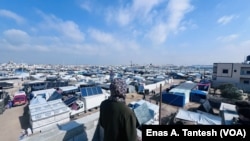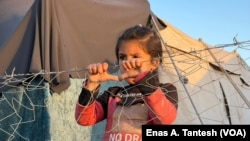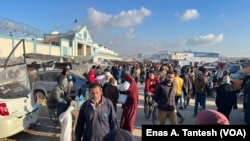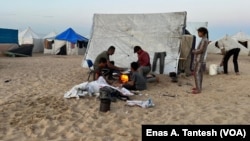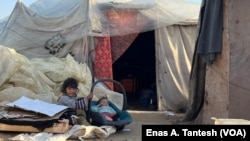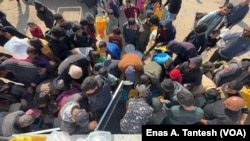Children in Gaza haven’t been to school since the Israel-Hamas war began, but parents here say, right now, this is the least of their problems.
The United Nations says more than 12,000 children have died in the war, and 20 of starvation in recent weeks. Another 17,000 children have lost or been separated from their parents.
Most children in Gaza have been forced to flee their homes, and parents say even the best cared-for are traumatized.
“[My son] is constantly awake at night, crying,” says Hekmat Almasri, the mother of 12-year-old Abed Alrazeq Almasri. Since the war began, her husband, a doctor, has lived at the hospital where he works. His small family fled to a makeshift camp in Rafah, in Gaza’s south, where they live in a tent near the border with Egypt.
“[My son] says, ‘I miss my father. I wish we could go back home,’” adds Hekmat Almasri. “I want to live the normal life that we used to live.”
More than 31,000 people have been killed in Gaza, according to the Gaza ministry of health. The war began October 7, when Hamas attacked Israel, killing 1,200 people and taking 240 hostages.
Most of Gaza’s 2 million-plus population is now crowded into emergency shelters in Rafah, but hundreds of thousands of people are living in the north, where hunger has reached “catastrophic levels,” according to the U.N.
But even in the south, where the population of Rafah has increased six-fold in recent months as people await what Israel says is a coming assault, the food crisis has become an emergency. Pediatricians in the south say every child they see is suffering from noticeable psychological and physical trauma, and the consequences of hunger.
“All of them are having problems growing,” says Dr. Saeed Abdulrahman Mahmoud Marouf, a doctor at Abu Yousef Al Najjar Hospital. “All of them are sick. Even the mothers don’t have milk to feed their babies. They say, ‘I can’t make milk to give them and how could I possibly buy it?’”
Psychological damage
Some children, says Marouf, can clearly identify bombs, planes and who among their family or neighbors have died. Other children wail and cling to their parents nearly all the time. Many have started to hallucinate.
Despite the suffering, there are children who have hope that they will be reunited with loved ones, adds Almasri, the mother.
“I wish to go home,” says her son, Abed Alrazeq Almasri, when asked what he would ask for if he had one wish. He now spends his days searching for food and counting the days since he last saw his father in October. “I used to go to school, but now I don't go to school. I used to play with my friends.”
His mother says watching the children learn and relearn the depth of the crisis is heartbreaking.
“The mothers cannot answer their children’s questions,” she explains. “They can’t answer their needs… even for food. Children will ask for meat, or fish, or chocolate or sweets that they used to eat. But we can’t get it now.”
Hunger disaster approaching
Israel says it places no restrictions on the amount of aid that can get into Gaza, but it does inspect all deliveries to make sure they don’t carry weapons or other items meant for use by Hamas.
Israel blames the U.N. for the slow distribution of food aid, but the organization says distribution problems are caused by the ongoing conflict and Israeli military checkpoints.
Amnesty International accuses Israel of “blocking and impeding the passage of sufficient aid into the Gaza Strip, in particular to the north which is virtually inaccessible.”
The U.N. says widespread starvation is imminent if access does not improve dramatically. Efforts to bring in aid via air or sea, they say, can provide only a fraction of the massive influx of food that is needed.
“Airdrops are a last resort and will not avert famine,” said Carl Skau, the World Food Program’s deputy executive director in a March 5 statement. “We need entry points to northern Gaza that will allow us to deliver enough food for half a million people in desperate need.”
Nedal Hamdouna and Amjed Tantesh contributed to this report.
